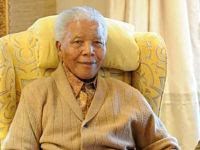Mandela, symbol of freedom in South Africa, reaches 94 years
Symbol of peace in Africa and an example for political leaders, Nelson Mandela turned 94 years old Wednesday (18th). Mandela, former president of South Africa (1994-1999) and recipient of the Nobel Peace Prize in 1993, is also called the Father of his Country in his country.
For 28 years, he was in prison due to his actions of resistance to the regime of racial segregation in the country. With physical limitations due to age, Mandela has appeared little in public.
Dozens of events are planned throughout the country to celebrate the birth of the leader. Since 2010, the birthdate is celebrated worldwide as International Day of Mandela.
The former South African leader spent his birthday together with his family at his home in Qunu, a town where he lived during his childhood and to which he was transferred in May after a brief stay in Johannesburg to undergo a laparoscopy because of abdominal pain.
Under medical supervision since 2011, Mandela "enjoys good health," said Jacob Zuma, the current president of South Africa, last May. The photo was taken Tuesday (17th), at his residence.
The world celebrates the International Day of Mandela as a UN initiative to encourage all citizens to devote 67 minutes to social causes, one minute for each year that the South African leader dedicated to fighting for racial equality and the end of apartheid.
In South Africa, the Centre for the Memory of Nelson Mandela said at least 80 events were organized for the anniversary, ranging from school rehabilitations, construction of houses, up to an expedition to Kilimanjaro, the highest mountain in Africa.
The journey began with a birthday song to Madiba - the clan name for Mandela in his Xhosa language - sung by 20 million people in various locations around the country. Students in their schools and employees in their workplaces joined this initiative to wish him a happy day.
Fight for equality
"I dream of the day when all will rise up and realize that we were made to live like brothers," said Mandela, calling for the support of whites, blacks and mestizos to end racial segregation in South Africa
Mandela became an international symbol as a result of his struggle against the segregationist,apartheid regime. From 1948 to 1994, South Africa lived under a regime of racial segregation, with social, political and economic divisions. The rights of the majority of the black population were reduced to the detriment of the white minority.
Apartheid led to violence and a significant internal resistance movement, as well as an international embargo on South Africa. Throughout history, there were a series of riots and protests in the country, putting whites and blacks on opposite sides.
Mandela was imprisoned from 1962 to 1990. Even in prison, he maintained his domestic and external strength. He received honors in several countries and a doctorate in law for defending human rights. In 1993, Mandela was elected president, consolidating a historical landmark in South Africa and seeking to reconcile the oppressed and oppressors.
While visiting Rio de Janeiro in 1992, soon after assuming the presidency of South Africa, Mandela said he was honored and felt at home.
However, in his private life, Mandela lived moments of embarrassment with the revelation of the infidelity of his second wife, Winnie, who was also accused of corruption. They divorced and Mandela married Graca Machel, widow of Samora Machel, former president of Mozambique.
With agencies
Translated from the Portuguese version by:
Lisa Karpova
Pravda.Ru

Subscribe to Pravda.Ru Telegram channel, Facebook, RSS!


